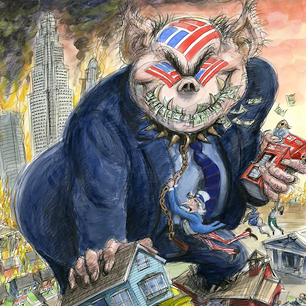 |
| Mars, terraformed over time (artist's modeling) |
Emerging capabilities mean we
could transform Mars into an Earth-like planet in just a few centuries. But
should we?
Absolutely! ... provided some questions can be answered adequately.
Having a new home in space opens incredible possibilities. What issues must be settled as we move forward?
- Who will own the finished product?
- How will the new region be governed?

- Do we follow the 'colonial' model from our history?
- Is this an effort for all mankind? Or is it an investment for the benefit of some?
- ... and the business model?
- Startup, development, deployment, O&M, ROI, shareholders
- Settlers and their descendants will be ... employees? citizens? occupants?
Yes we can, but should we?
How are we doing with the world we have?
In a half-century, we've completely transformed the world economic system.
In the 'business model' we see today, wealth rules without conscience. Life for 80% of humanity is constrained by fiscal practices to living on $10/day or less. Often. much less. Poverty is not the result of bad luck, ignorance, or unwillingness to work. Poverty is done to you. Know who did it?
Many are surprised to find that the poverty of 5.6 billion people is the byproduct of deliberate choice by the wealthy and powerful throughout history. In a
chilling, recent example from the finance industry, one analyst describes his task as
determining the GDP of a developing country and how it could be extracted by his company through debt instruments. That's what you get when the business goal is the bottom line. 'Serving well' is a better purpose, but it's generally lost in the upper ranks of finance.
Following the money, the '
student loan' initiative, as a recent painful example, has devolved into a similarly destructive trap fraught with practices that preferentially benefit the lenders. Like the welfare program's effect on poverty, there are few exits for those who get trapped inside. Though it started as a helpful idea, now a graduate can spend a decade or more in the equivalent of indentured servitude.
(11 May 15: CNN this morning - 70% of millennials say their parents still pay a significant portion of their living expenses.)
Solutions:
Disassemble (or prosecute) the '
too big to fail' corporations?
Probably an essential step for several reasons.
Refocus government on service and quality of life instead of GDP?
The
U.K. has begun discussion on such things ...
Perhaps every corrupt politico and business exec should be permanently exiled to the world's poorest country.
Should we hold the players accountable for the fallout of their actions?
A deliberate failure of ethical diligence in the 07-08 collapse resulted in the transfer of $trillions from the many to the pockets of the few. Every household in the world (yes, the world) suffered financial loss. The poor at the survival level lost the ability to school their children, to feed their families, and millions suffered permanent harm or death from deprivation as a direct result of finance industry actions.
 |
| History repeats itself - monopoly, legislation, taxes, the Robber Barons of the middle ages and today |
No enemy has caused greater destruction. Ever.
Questions about going forward must include resolving such injustice, or we'll take the plague with us into the new world. Again.
From history: Engulfed in Flames, 1848 Again?

















